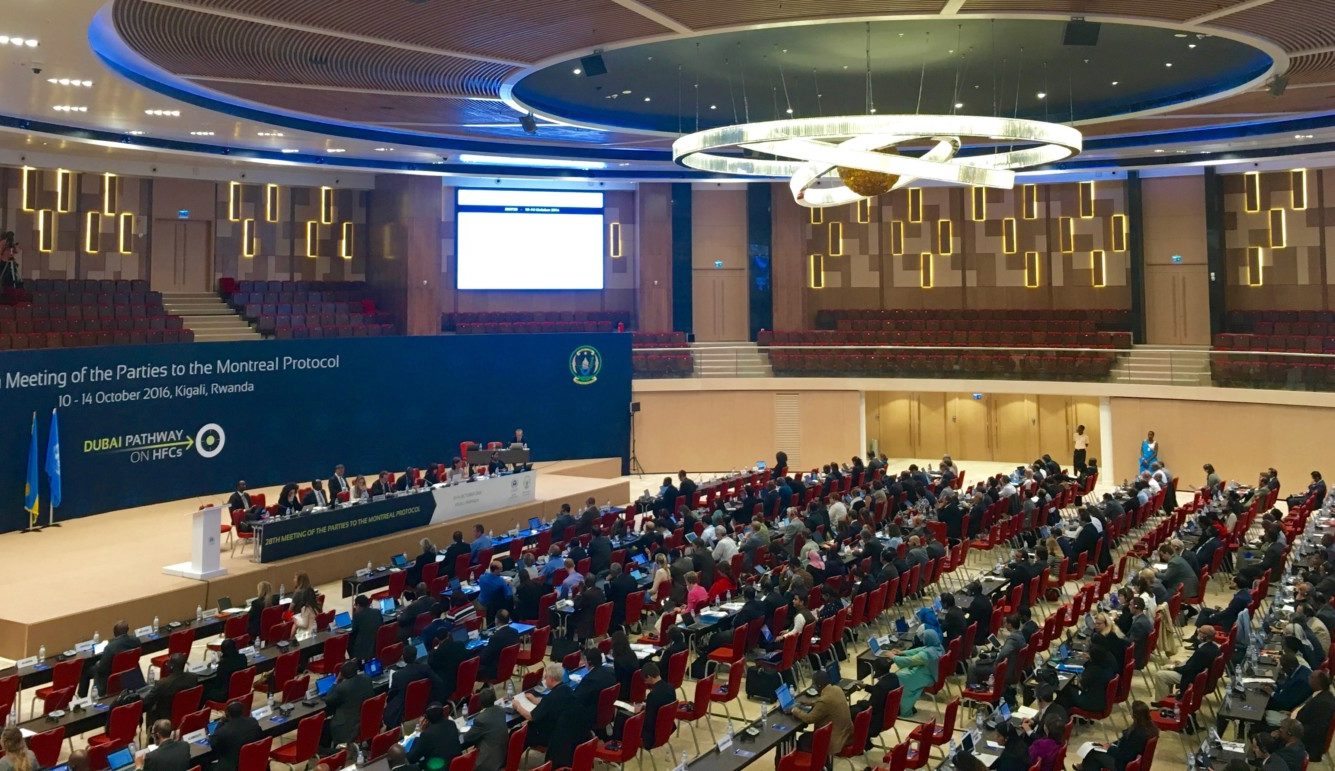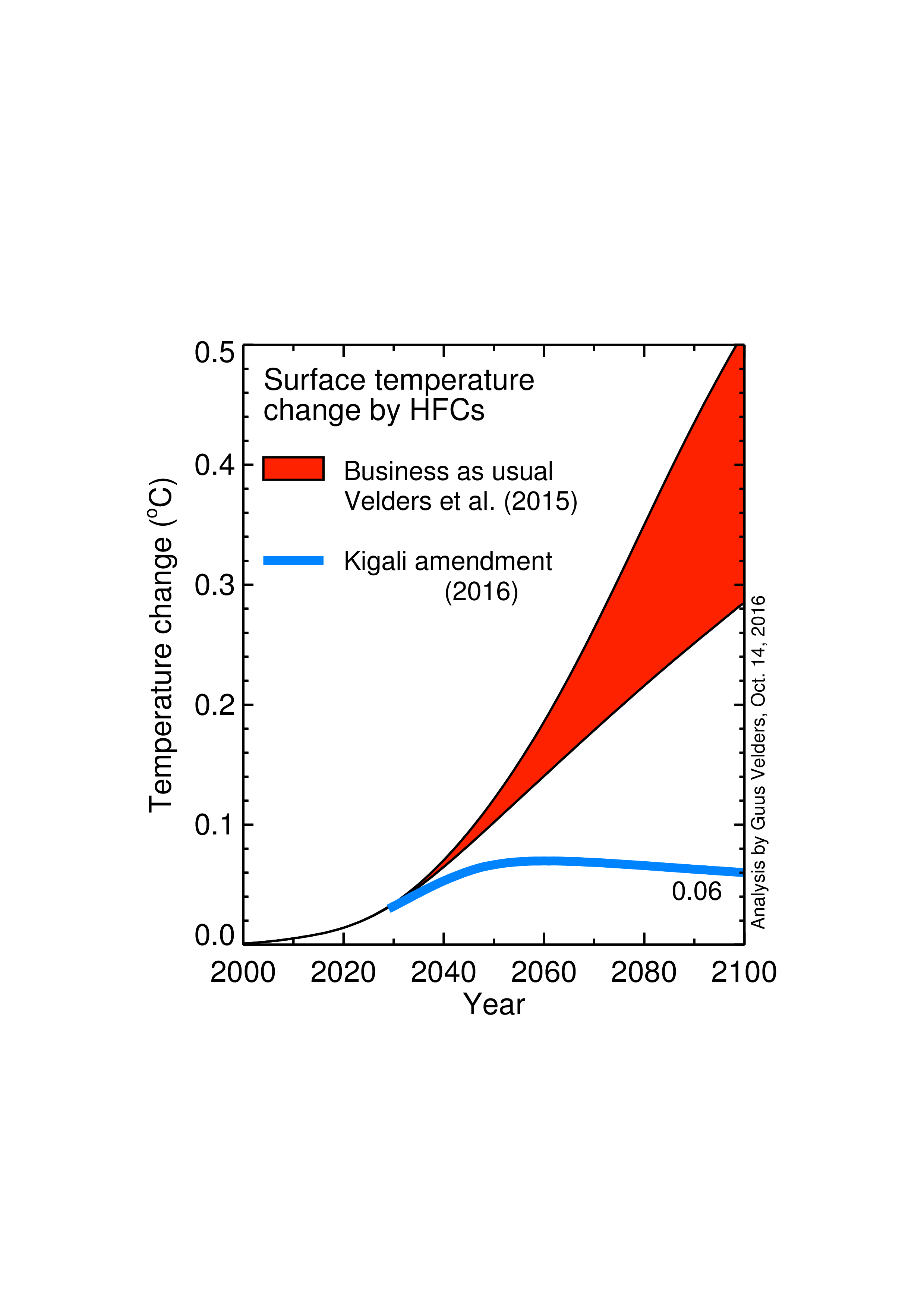Nations Agree to Kigali Amendment: Largest Near-Term Temperature Reduction from Single Agreement

Kigali Amendment to Montreal Protocol eliminates warming from one of six main greenhouse gases
Kick-starts markets, avoiding nearly 0.5°C warming, plus mitigation from energy efficiency
Kigali, 15 October 2016 – Warming caused by one of the six main greenhouse gases will be taken out of the climate system through the Kigali Amendment agreed in the early morning hours today in Rwanda. The amendment to the Montreal Protocol to phase out HFCs is the largest temperature reduction ever achieved by a single agreement.
“We came to take a half a degree Celsius out of future warming, and we won about 90% of our climate prize,” said Durwood Zaelke, President of the Institute for Governance & Sustainable Development. (See graph below.)
“The majority of the low-hanging fruit has been picked with this amendment, and we’ll get the rest through market forces,” added Zaelke. “The Montreal Protocol has always catalyzed market transformation faster than the mandated dates for phase-outs. It’s also always been a start and strengthen treaty, and I’m confident in its power to get all the climate mitigation available.”
Following ratification of the Paris Agreement last December, the Montreal Protocol HFC amendment moved into the international spotlight as the next critical step on climate, and the biggest and fastest mitigation strategy available in the near-term.
“An ambitious HFC amendment is likely the single most important step that we could take at this moment to limit the warming of our planet and protect the planet for future generations to come” said US Secretary of State, John Kerry in an address to the Parties today. “No country has a right to turn its back on this effort.” And no country did.
“This is a victory for the atmosphere, but also for the citizens and corporate leaders who supported the HFC Amendment for many years,” said Stephen O. Andersen, IGSD Director of Research. “It is a business opportunity for the companies who deliver super-efficiency with the next-generation lower-global warming potential (GWP) alternatives.”
“The Kigali Amendment, and the pledged funding behind it, insures we fully maximize the energy efficiency benefits available during the refrigerant transition, adding the potential to double the climate mitigation,” said Zaelke.
“With the Montreal Protocol amendment, we’ve moved from Paris pledges to concrete action,” Zaelke added. Unlike the Paris Agreement, the Montreal Protocol is a treaty that commits all countries to mandatory mitigation measures and ensures compliance through a robust compliance assistance program, backed up with sanctions. To date, the treaty has phased out nearly 100 similar climate pollutants by nearly 100%.
The Kigali Amendment is a huge victory for Africa, who was a critical player in achieving an ambitious agreement. “The Kigali Amendment is the most significant climate mitigation step the world has ever taken, and brings us closer to staying below 1.5°C,” said Vincent Biruta, President of the Meeting of the Parties, and Minister of Natural Resources for Rwanda.
“The march towards Marrakesh began today in Kigali with the decision to eliminate warming from HFCs. This is the most important step on the implementation of the Paris Agreement. Today we agreed on mandatory obligations in order to phase down a super greenhouse gas and we will do it using a tool that has always delivered, the Montreal Protocol,” said Hakima El Haite, Minister of Energy, Water, and Environment Morocco and COP22 High-Level Champion. “Concrete global action at scale has begun, and we are not turning back.”
The Federated States of Micronesia and Mauritius, along with Morocco, submitted the first formal proposal in 2009 to amend the Montreal Protocol to phase down HFCs. As Micronesia President Christian said, “this is an opportunity the world cannot afford to miss.” And the world didn't.
The developed countries start in 2019 with a freeze, which caps future growth, and an immediate 10% reduction. The progressive group of developing countries, which includes China, have a freeze date of 2024, and India and the few other less ambitious countries have a freeze date of 2028. The early action by developed countries and the ambitious group including China insures a fast market transition, which means the transition of the laggards will be much faster than their ultimate date.
“Montreal Protocol is probably the most successful agreement on planet earth… implemented down to the last letter by everyone,” UNEP Executive, Director Erik Solheim said, adding that an HFC amendment is one of the cheapest, one of the easiest, and one of the lowest hanging fruits in the arsenal of climate change.
[The growth depicted in the graph below does not factor in the additonal growth in air conditioning and other cooling devices that will be driven by a warming world. Nor does the mitigation factor in the additional mitigation from increasing the energy efficiency of air conditioning and other cooling devices that the amendment is expected to catalyze, based on past phase outs. Lawrence Berkeley Lab calculates that efficiency gains of room air conditioners alone could perhaps double the climate mitigation.]
